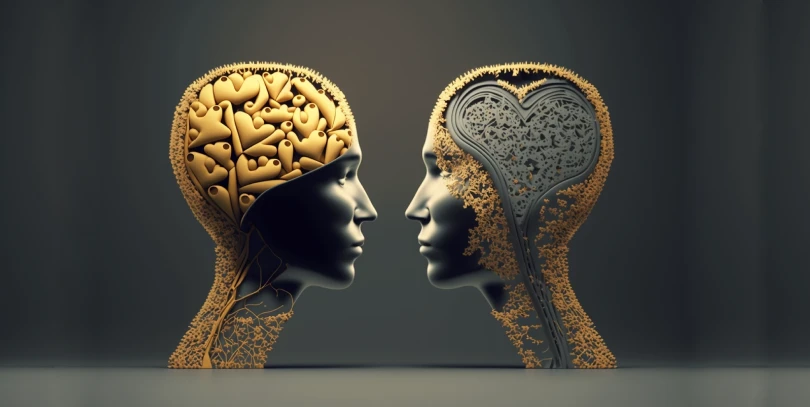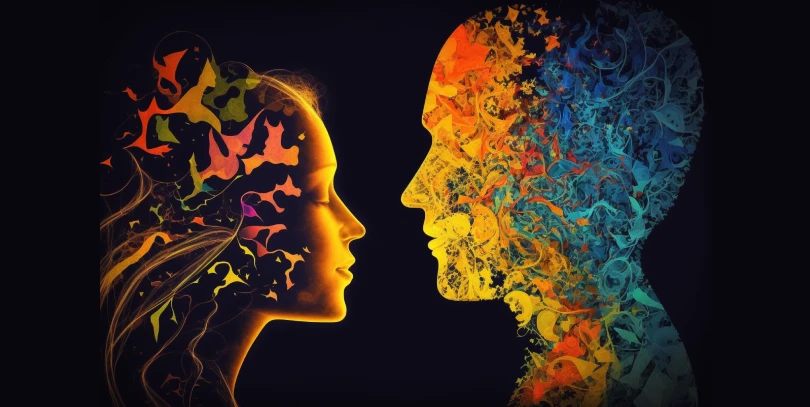What is Emotional Intelligence and How Can It Help You?

- What is emotional intelligence
- How emotional intelligence affects personal and professional Life
- Self-Awareness, empathy, social skills, and self-management in relation to emotional intelligence
- How understanding your emotions can lead to better decision making
- Improving relationships with friends and colleagues through emotional intelligence
- Stress management strategies provided by high emotional intelligence
- The importance of developing emotional intelligence for success in personal and professional life
What is emotional intelligence
Emotional intelligence is the ability to recognize, understand, and manage one’s own emotions and the emotions of others. It includes:
- Self-analysis;
- Empathy for others;
- Social skills;
- Self-management.
This means that a high level of emotional intelligence can help you both in your personal life and in professional relationships. Developing the ability to understand your emotions and respond appropriately can bring numerous positive outcomes. These include more effective decision-making, improved relationships with peers and colleagues, better stress management, and much more!
Emotional intelligence is important not only for managing interpersonal relationships but also for achieving success in any field or endeavor. As emotional intelligence increases, so does self-confidence and the ability to calmly cope with difficult situations.
How emotional intelligence affects personal and professional Life
Emotional intelligence helps us in both personal and professional life.
Enhancing emotional intelligence allows us to make more balanced decisions, strengthen relationships with friends and colleagues, learn to cope better with stress, and be more self-confident. When we possess emotional intelligence, it’s also easier for us to calmly handle difficult situations.
From a professional standpoint, emotional intelligence helps us develop better communication and teamwork skills, create stronger teams, and foster a more productive work environment. Having a stronger emotional intelligence can help us become better leaders and effectively solve problems.
Self-Awareness, empathy, social skills, and self-management in relation to emotional intelligence

A high level of emotional intelligence requires a strong sense of self-awareness. Being aware of one’s own emotions and how they can interact with others allows one to be more in harmony with their thoughts and feelings, as well as with the feelings of others.
Self-awareness is the ability to understand our own feelings and thoughts and how they can influence our behavior and decisions. It allows us to identify when we are experiencing stress, anxiety, or overwhelm, and take steps to cope with these feelings in a healthy way.
Empathy is another crucial component of emotional intelligence. It involves the ability to put oneself in another person’s shoes and understand their feelings and motives. A high degree of empathy helps us build stronger relationships with others and better understand their needs.
Social skills are also key to developing emotional intelligence. These include the ability to communicate effectively, both verbally and nonverbally, as well as the ability to read body language, facial expressions, and social signals. Being able to recognize these signals allows us to navigate conversations and interactions with others better, establishing trust and understanding in relationships.
For an emotionally developed person, the ability to manage oneself is very important. This includes the ability to control one’s emotions rather than allowing them to take over in difficult situations. It also means having the discipline necessary to set goals, make plans, prioritize tasks, and focus on what needs to be done to achieve success.
How understanding your emotions can lead to better decision making
Understanding your emotions is the key to making better decisions. When you are aware of your feelings and reactions, you can establish more meaningful connections with the people around you and understand their behavior motives. With such a deep understanding of yourself and others, you can make decisions based on what is best for all involved.
Emotional intelligence gives us the ability to pause before making a decision, allowing us to take the time to think about our choice and understand all possible consequences. The ability to consider multiple perspectives allows us to make more informed decisions, not guided by our own biases or emotions.
We can also use emotional intelligence to evaluate our past decisions — both successful and unsuccessful — as we learn by analyzing why certain decisions worked well and what could have been done differently, looking back.
Understanding your emotions can also help us better recognize how we react in acute situations, to avoid making hasty decisions that may not reflect our true values or intentions. By being aware of our feelings and reactions, we can act from a position of empathy towards others, creating constructive solutions that benefit all involved.
Moreover, strong emotional intelligence allows us to effectively manage stress so that it does not adversely affect the decision-making process. Recognizing when stress starts to interfere with our decision-making, we can take proactive steps to deal with it in advance, rather than letting it get out of control.
Mastering relaxation techniques, such as deep breathing exercises or mindfulness practices, can help reduce stress levels and calm down enough to clearly think through possible solutions, not allowing emotions to cloud our vision.
Overall, a higher level of emotional intelligence gives us the ability to make more sensible decisions that will be beneficial to all parties in the long run — whether in personal relationships or professional activities. Being aware of our own emotions leads to increased self-awareness, allowing us to have a clearer understanding of how various decisions can differently affect the outcome, ultimately improving our ability to make decisions in both personal and professional spheres!
Improving relationships with friends and colleagues through emotional intelligence

Emotional intelligence plays an important role in forming and maintaining healthy relationships with friends and colleagues. It helps us understand our own emotions and reactions, as well as the emotions and reactions of the people around us.
By being aware of our feelings, we can better assess body language, voice tone, facial expressions, and other non-verbal signals of other people to better understand their emotional state in a given situation. This allows us to respond to them in a way that shows attention and understanding, rather than reaction or insensitivity.
Moreover, a high level of emotional intelligence helps us develop empathy for others. We can better accept differences between people, rather than judging or disregarding them. We can also recognize when someone is going through hard times, allowing us to offer support and compassion, instead of turning away from the situation or making assumptions about what they feel.
Increased emotional intelligence gives us the ability to communicate more effectively with others. We can clearly express our thoughts, not letting emotions take over the conversation, leading to productive dialogue and problem-solving skills that benefit all involved.
In addition, it gives us the ability to actively listen, not interrupting or imposing our beliefs on others, which makes it easier to build trusting relationships with those around us based on mutual respect and understanding.
Improving social skills due to a higher emotional intelligence over time leads to strengthening relationships with friends and colleagues, as people realize that in any relationship there is always room for growth. With this realization comes an understanding of these relationships, leading to a deeper connection based on trust and acceptance.
A high level of emotional intelligence allows us to form meaningful relationships with friends and colleagues, enabling us to understand our own feelings as well as the feelings of the people around us, leading not only to improved social skills but also to a better understanding of why certain things are said or done in a certain way, so that all parties are heard and respected equally!
Stress management strategies provided by high emotional intelligence
Thanks to the development of emotional intelligence, we are better equipped with the tools for proper stress management. By understanding our emotions and mood, we can effectively recognize when we feel overwhelmed and take the necessary steps to cope with this feeling.
One of the best methods of stress reduction is self-care activities such as journaling, yoga, or meditation. By taking time for our mind and body, we can reconnect with ourselves and better understand what may be causing us stress.
Journaling can be an effective way to track our feelings over time to identify any patterns that may cause us additional anxiety or worry. This helps us better understand what exactly causes us stress, so we can take proactive measures before it reaches an unmanageable level.
Developing a higher level of emotional intelligence also gives us the ability to regulate our emotions in difficult situations, using deep breathing techniques and other mindfulness practices. Thanks to these practices, we can gain control over our thoughts, which helps reduce stress levels and calm down enough to clearly think through possible solutions, not allowing emotions to cloud our vision.
Learning positive visualization can also reduce stress levels, allowing us to imagine more positive outcomes during a crisis or difficulties. Visualizing success helps us focus on solutions, rather than dwelling on problems, leading to reduced emotional reactivity and more productive problem-solving!
Finally, a higher level of emotional intelligence gives us the ability to self-compassion, allowing us to forgive ourselves when things don’t go as planned, giving us the opportunity to move forward, rather than getting stuck in negative self-talk or ruminations about past mistakes. Recognizing any failures as opportunities for growth allows us to shed the guilt associated with failure and disappointment, so we can meet future challenges from a position of strength and confidence!
The importance of developing emotional intelligence for success in personal and professional life
In conclusion, I want to say that emotional intelligence is an invaluable tool for navigating both personal and professional life. By developing our own emotional intelligence, we can develop self-awareness of our feelings and emotions, as well as those of the people around us. This will lead to improved decision-making, improved relationships with friends and colleagues, stress management strategies that work for us individually, and a greater understanding of how we interact with the world around us.
Strong emotional intelligence gives us the ability to better understand ourselves on a deeper level, leading to success in all areas of our life!
